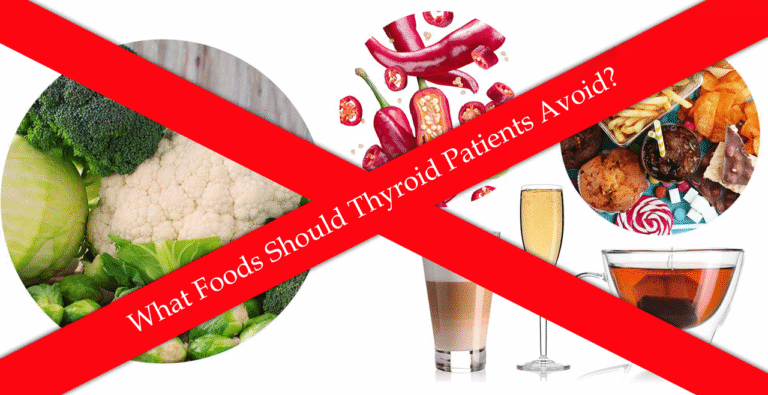Knowledge
Foods to Avoid with Thyroid Disease: A Complete Guide for Better Health

🦋 Foods to Avoid with Thyroid Disease: A Complete Guide for Better Health
If you’re dealing with a thyroid disorder or caring for someone who is, knowing what foods to avoid is just as important as taking the right medication. Diet has a direct impact on thyroid function, especially for those with hyperthyroidism or hypothyroidism. In this article, we’ll break down the top foods to avoid with thyroid disease, why they matter, and how to support your health with smart dietary choices.
🔍 What Is a Thyroid Disorder?
A thyroid disorder occurs when the thyroid gland—located at the front of the neck—produces too much or too little thyroid hormone. These hormones are essential for regulating the body’s metabolism, heart rate, temperature, and other critical functions.
There are two main types:
-
Hyperthyroidism: Overactive thyroid producing too much hormone.
-
Hypothyroidism: Underactive thyroid producing too little hormone.
Both conditions can be managed with medication, but diet also plays a key role.
⚠️ Foods to Avoid with Thyroid Disease
Knowing what not to eat when you have thyroid problems is crucial. Here’s a list of foods and drinks to avoid for thyroid patients, especially those with hyperthyroidism:
1. Caffeinated Beverages (Coffee, Tea, Energy Drinks)
Caffeine stimulates the nervous system and can worsen symptoms like heart palpitations, anxiety, and insomnia. Avoid or limit consumption if you have an overactive thyroid.
2. Alcohol
Alcohol can interfere with thyroid hormone levels and the effectiveness of thyroid medications. It may also impair liver function, which is crucial for hormone regulation.
3. Spicy Foods (Chili, Hot Peppers)
Spicy foods increase metabolism and body heat, which may lead to symptoms like rapid heartbeat or difficulty breathing in people with hyperthyroidism.
4. Goitrogenic Vegetables
Goitrogens are substances that can interfere with iodine absorption—a key mineral for thyroid health. Limit these, especially if eaten raw:
-
Broccoli
-
Cauliflower
-
Spinach
-
Kale
-
Cabbage
-
Turnips
-
Horseradish
-
Mustard seeds
Too much goitrogenic food can trigger goiter or worsen existing thyroid issues.
5. Natural Diuretics
Foods like asparagus, seaweed, bamboo shoots, and pickled vegetables may cause excessive fluid loss, which can strain the metabolism and make symptoms worse for hyperthyroid patients.
6. High-Sugar and High-Fat Foods
Processed sugar and trans fats disrupt hormonal balance, slow down metabolism, and can reduce the effectiveness of thyroid medication.
✅ How to Take Care of Your Thyroid Naturally
Managing a thyroid condition requires more than just avoiding the wrong foods. Here are some key lifestyle tips to support thyroid health naturally:
-
Take prescribed medications regularly and follow up with your doctor for dose adjustments.
-
Eat a balanced diet rich in whole grains, lean proteins, healthy fats, fruits, and vegetables.
-
Stay physically active to reduce stress and improve hormone regulation.
-
Avoid smoking and alcohol, which can negatively impact thyroid function.
-
Get enough sleep and reduce exposure to unnecessary stress.
-
Avoid self-medicating or using herbal supplements without medical advice.
💡 Tip: Women of childbearing age should ensure their thyroid condition is well-managed before planning pregnancy.
📌 Final Thoughts: Thyroid Diet Tips for Better Quality of Life
A proper thyroid diet is essential for long-term health. Avoiding goitrogenic foods, caffeine, and excess sugar while focusing on whole, nutrient-dense meals can help your thyroid function more efficiently. Small changes in your eating habits can lead to big improvements in your energy, mood, and overall quality of life.
🧠 Frequently Asked Questions (FAQ)
Q: What are the worst foods for thyroid patients?
A: Caffeinated drinks, alcohol, goitrogenic vegetables (like raw cabbage and broccoli), and foods high in sugar or fat.
Q: Can diet cure thyroid disease?
A: Diet alone cannot cure thyroid disorders, but it plays a key role in managing symptoms and supporting hormone balance.
Q: Should people with hypothyroidism avoid the same foods?
A: Some overlaps exist, like limiting goitrogens and sugar. However, people with hypothyroidism may need different nutritional strategies than those with hyperthyroidism.
